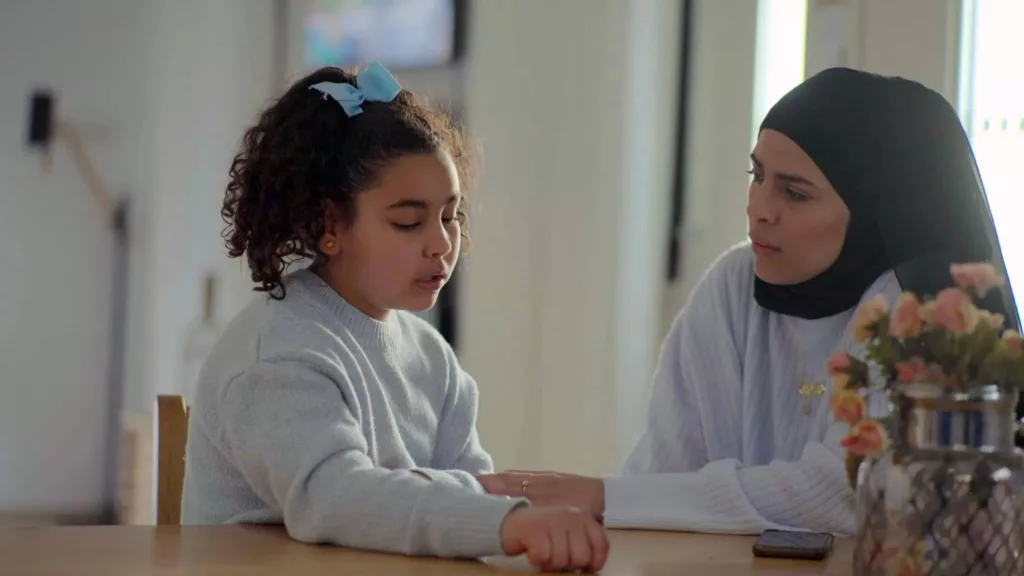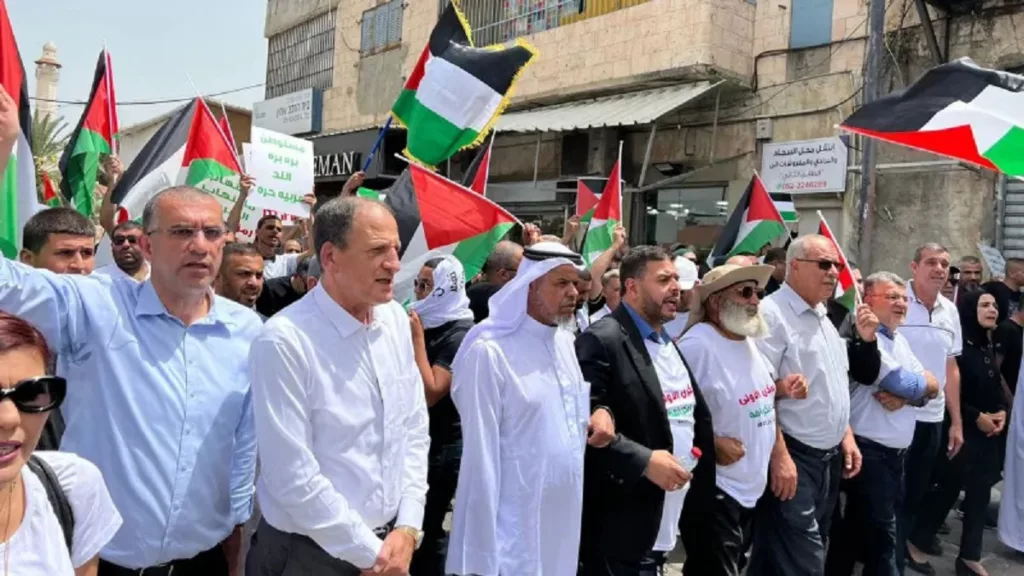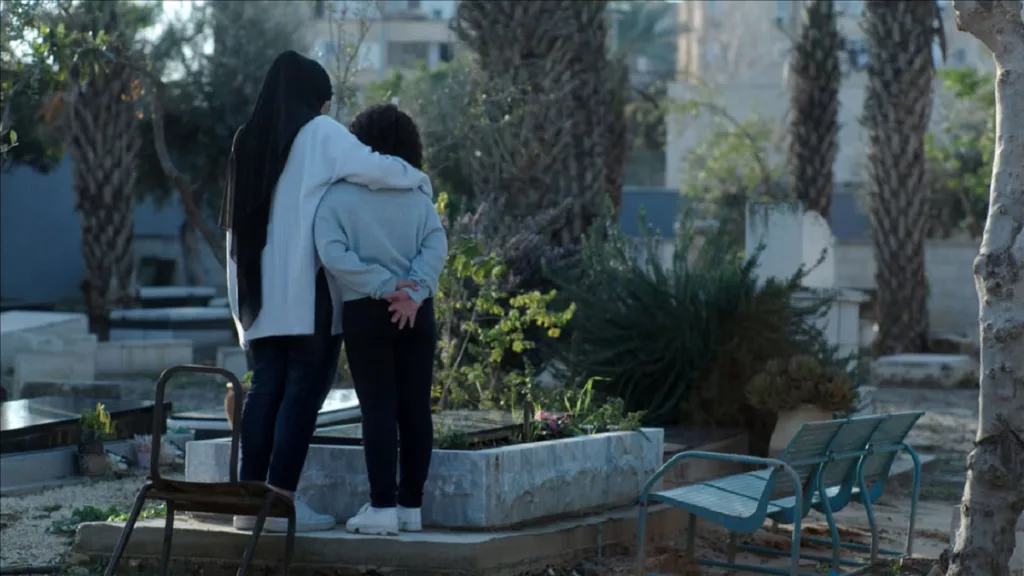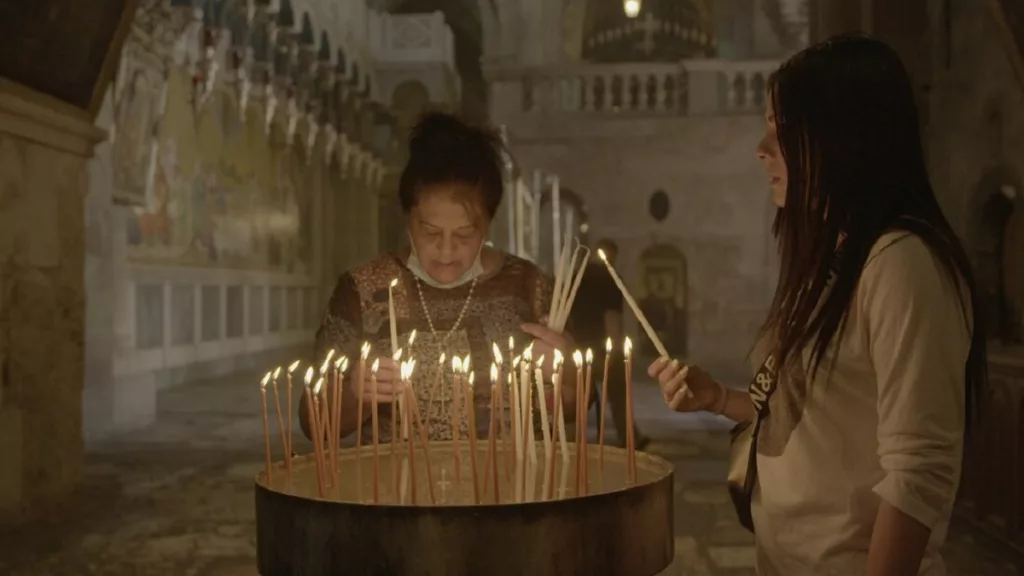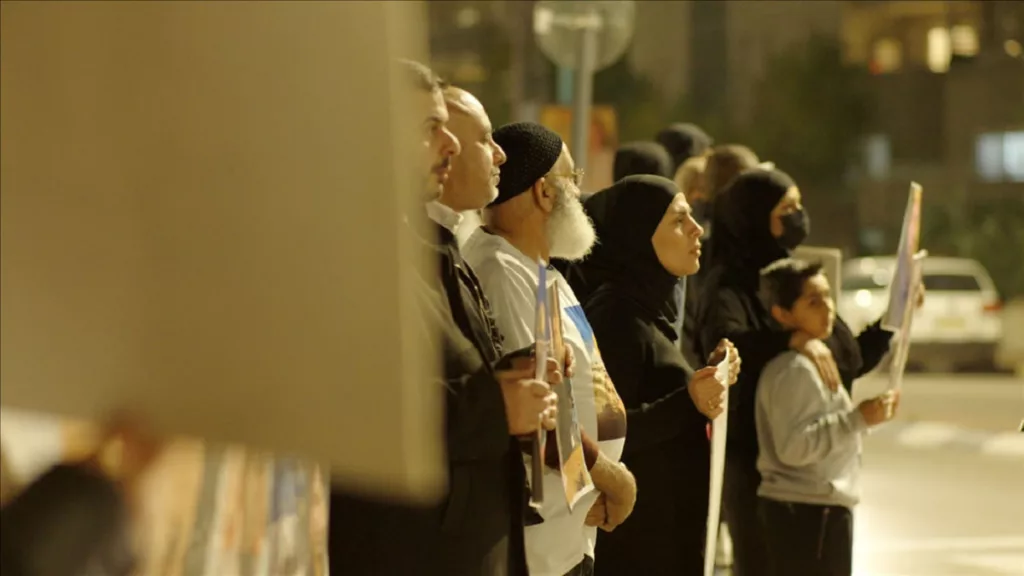The 2021 film Mourning in Lod, directed by Hilla Medalia, tells the deeply moving story of three families brought together by tragic events in the mixed Israeli-Palestinian city of Lod. At the heart of it are Yigal Yehoshua, a kindhearted Israeli man, and Musa Hassuna, a Palestinian father known for his warm smile. Both were making their way home one evening when their lives were cut short: Yigal was killed in a rock attack, and Musa was shot by an Israeli settler during protests over his murder.
Through intimate portraits of these families in grief and the communities around them, Medalia provides a window into lives entwined across divisions. A rare glimpse comes through Randa Aweis, the Palestinian Christian woman whose life was saved by Yigal’s organ donation. We also hear from Yigal’s distraught brother Efi and Musa’s father in their fierce calls for justice. Above the political turmoil, their testimonies reveal shared hopes for peaceful coexistence.
Yet tensions everywhere simmer, from protest clashes to the unequal handling of the men’s trials. The film shows life’s fragility and the strain of living with such an imbalance, leaving us to reflect on the urgent need for reconciliation in a place where destiny so often knots people together, even in times of deepest sorrow.
Lives Intertwined
The film recounts the tragic events that forever linked these three families. On that fateful night in May 2021, Yigal Yehoshua drove through the city, as was his regular routine. But on this night, chaos had erupted in the streets during protests over an earlier killing. In the melee, someone hurled a massive rock that came crashing through Yigal’s window. Though badly injured, he somehow managed to steer to the parking lot of his home before collapsing, captured in haunting security footage.
The previous day, Musa Hassuna had been making his own way home from work when he crossed paths with an armed settler. In an instant, a shot rang out, and Musa crumpled to the ground, his dreams of family trips shattered. Anger and grief from his community spilled over in demonstrations calling for justice. It was amid this unrest that Yigal lost his life.
Both killings left families torn apart by unfathomable loss. Yet Yigal’s final act was one of kindness—his family donated his organs, saving the life of Randa Aweis. For years, she had suffered from failing kidneys, clinging to the hope of a donor. The transplant gave her a new chance at life and health.
We come to know each family through intimate portraits of their struggle and resilience. Yigal’s brother, Efi, grapples with rage over the faceless assailants. Musa’s father finds grace to appeal for peace, though he is haunted by his son’s unjust death. And Randa endeavors to honor Yigal’s gift through her recovery.
Their stories unfold against a backdrop of tensions hardly resolved, a microcosm of the region’s divisions and imbalances. But in shining light on these ordinary lives entwined by extraordinary coincidences, the film reminds us of our shared humanity.
Windows into Truth
Director Hilla Medalia adeptly uses cinematic style to bring intimate insight to her subjects. The camera lingers in quiet moments, closely observing familial interactions through pain and perseverance. Tight shots focus attention on expressions rich in nuanced emotion.
Judicious lighting casts realism, avoiding sentimentality. In shadowed rooms, tear-stained faces speak of private suffering. Yet, outdoors, the sun bears down, mirroring each family’s capacity for resilience. Subtle makeup conveys the toll of grief, accentuating raw humanity.
A restrainted score sweeps in at just the right beat, eliciting feeling without manipulation. String instruments glide sorrowfully during mourning ceremonies, while percussion subtly stirs at protests’ edge. The music enhances without overpowering authentic reactions.
At times, composition seems almost voyeuristic. Could scenes have been staged for the perfect scene? Yet the raw anguish feels too visceral to doubt. Without intrusion, Medalia carefully curates windows into lives, navigating conflict’s aftermath.
Nuance emerges from her selected elements. Editing weaves empathy, presenting shared pain across divisions. Though omitting outside context risks simplification, intimate portraits at least generate connection on a common ground of loss.
Through filmmaking finesse, Medalia brings dimension to individuals amid turmoil. Her observant lens keeps focus on persevering humanity, directing our gaze within to find strength even where resolution seems out of reach.
Communal threads amid violence and injustice
Within Lod’s fraught tensions, lives intertwine in unexpected ways. Mourning in Lod touching explores this through Yigal, Musa, and Randa—three souls connected by chance, though from differing walks of life.
Yigal’s gift grants Randa renewed days. Yet shadows loom from deaths sparking her salvation. Musa’s absence leaves anguish, as does Yigal’s for loved ones. Their memories continue impacting communities, whether dividing or uniting, as reactions to killings expose societal fault lines.
Musa’s father navigates grief with the dignity of one seeking understanding, not hatred, in meetings with Yigal’s brother. Still, protests swell in pain, desiring an answer that never comes. Musa’s killer faces light reprieve, contrasting seven facing years for Yigal’s. Lod’s streets expose how threats perceive each family.
In longing for reconciliation, Efi and Marwa’s bond offers glimmering hope. But reconciliation stems from acknowledged wrongs and long-lasting change. And scenes portray discords more deeply rooted in systematic bias, with some celebrating life and others mourning without end.
Medalia lifts such disparities from interpersonal exchange to their systemic source. By filming protesters’ anger and distrust toward heavily armed forces, she signals suppression, diluting even the bereaved’s right to voice and be heard.
Cycle after cycle, violence breeds more violence, while injustices go unchecked. Yet within communities exist threads of care that transcend surface tensions, showing humanity’s capacity for good to persist. In spotlighting life’s fragility and death’s unfair hand, Medalia reminds us that our shared fate depends on justice and equity for all.
Lod’s mixed reality reveals no easy solutions, only hard truths deserving reflection. Where some find vindication, others find only more stones to throw. And as grief repeats its toll, the eye seeks not culprits but a willingness to understand all people’s claims as equally valid and work consistently to establish conditions where none feel forced to use violence as their sole recourse.
Touching Lives in Troubled Times
Mourning in Lod shines a light on human tales emerging from Israel’s volatile politics. It centers on those directly hurt—the Hassuna, Yehoshua, and Aweis families—living amid conflict that neither asked for.
Musa Hassuna’s unjust killing triggers mourning and protests. Yigal Yehoshua’s donation renews Randa’s hope, yet his death leaves scars. Their lives intertwined in a place routinely making headlines for all the wrong reasons.
The film sensitively captures personal grieving, from Randa’s tears of gratitude to Efi Yehoshua’s seething anger. Musa’s father finds strength in speaking with Efi, believing peace is possible if leadership lets go of past pains. Their bond lifts hearts, reminding us of our shared humanity, but our lives diverge.
Tragically, renewed fighting in 2023 intensified public wounds. The documentary finished just as calm ended, sharpening the perspectives offered. Efi grapples privately with forgiveness—hard won for anyone who’s lost so dearly.
And in portraying Lod’s reality, divisions and disparities become clear. Settlement expansion strains relations, and biases linger in the law. No dialogue solves the roots of crises, and recent bloodshed dims hopeful signs.
Yet through it all, some kept choosing understanding. Their quiet influence matters, whenever communities build bridges instead of walls. In recalling individual suffering, and souls who even in agony seek unity, the film pays tribute to the gentle spirit ever deserving support.
Its memory of lives lost and those who carry on against all odds stays with us. Though solutions seem distant, such stories of human ties that transcend strife remind us of all we share and why the quest for just peace can never end.
Moments of Hope Amid Deeper Questions
Mourning in Lod presents touching moments between families displaced by tragedy. In letting each speak of their private loss and find connection with others, no simple act offers poignant insights. However, by focusing mostly on individual sufferings, it leaves a wider context and causes something somewhat blurred.
We see clearly the emotions: Randa’s relief, Efi’s anger, and Marwa’s sadness at a life cut short. Their willingness to seek understanding across divisions lifts the soul. But in the sparing explicit examination of the system that enabled killings to go unequally punished, a part feels omitted. Wider history and conditions enduring generations later receive less light shed upon their role in families’ experiences.
Questions could be asked more directly about power holding some lives as more vulnerable and grievances less valid even when acts and impacts are alike. Neither prosecution nor the conditions forcing protests seem deeply interrogated as factors in the unrest, and solutions are scarcely proposed for inequity, some acknowledged but left unresolved.
Personal perspectives given ring true and call us to empathy. Yet a film raising political realities by showing human faces affected by them could move discussion to an examination of how nonviolent change may emerge. Presenting reconciliation as a natural end neglects injustice; some continue working to end it, and messages stateless receive about full belonging being denied.
Complexities recognized but not fully explored, limitations of solely intimate viewpoint become clear. still, in moments of hope cultivated between those who’ve know pain, common bonds we all share brightly, if briefly, glow.
Seeing Beyond Surface Struggles
This film offers an intimate glimpse into lives scarred by violence yet holding onto hope. Through following families coping with loss and finding connection, it highlights our shared humanity.
While focusing on individual suffering, Mourning in Lod shows how political divisions fuel interpersonal pains. Marwa anguishes yet believes future reconciliation possible. Despite their fury, Efi and others retain willingness to understand “the other”.
But the documentary also reflects deeper inequities. Contrasting legal outcomes for Musa and Yigal’s deaths say much about the unequal protection some receive. The film stops short of analyzing the oppressive systems sustaining the conflicts.
For viewers, this presents both reward and limitation. On one hand, it reminds of our duty to uphold dignity and justice for all. Its humanization of so-called “enemies” nourishes the view that non-violent co-existence remains achievable if addressing underlying harms.
However, by avoiding a broader critique, it risks presenting structural problems as natural cycles beyond redress. Real change demands acknowledging the powers perpetuating suffering and injustice.
Overall, though, this film has much to offer. Its intimate perspective conveys humanity in those scarred yet seeking understanding. And in showing hope survives even in despair’s depths, it reminds us that all capacity remains for healing if we collectively pursue the justice and care that nurture a peaceful, equitable life for all.
The Review
Mourning in Lod
Mourning in Lod offers an intimate window into personal tragedy amid political conflict. Through compassionately following interconnected families, it emphasizes our shared pulse of hope that transcends divisions. While focusing on individual struggles, the film shows how deeper injustice and inequity perpetuate intercommunity wounds. In conclusion, this documentary achieves impact by humanizing lives scarred by violence while still seeking understanding. However, its avoidance of structural critique presents limitations. On balance, though, the film's message—that reconciliation requires addressing underlying oppression through nonviolent pursuit of justice, dignity, and fair treatment for all—is one that, especially in these times, merits reflection.
PROS
- Intimate, emotional portrayals of family histories and grieving processes
- Highlights the humanity in all people, regardless of perceived differences
- Encourages empathy and questions preconceptions of "the other side."
- Promotes the message that peace requires addressing injustice and inequity
CONS
- A narrow focus on individual stories means a broader political context is lacking
- Stops short of critically analysing power structures underlying the conflict
- Risks present oppression as an intractable cycle rather than something that can be challenged









































